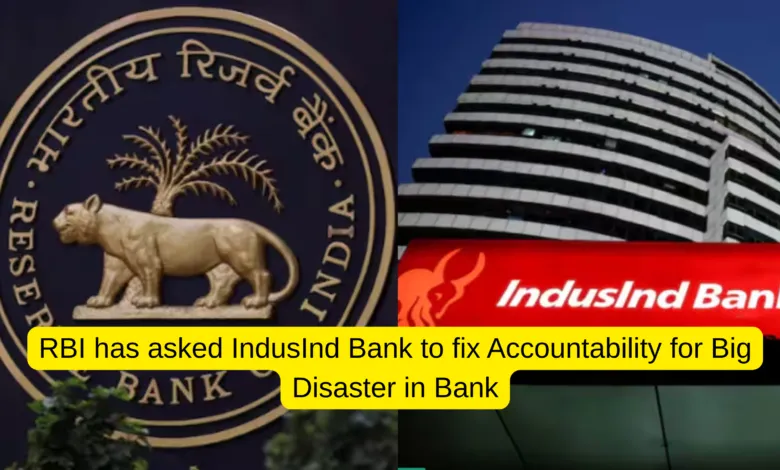RBI has asked IndusInd Bank to fix Accountability for Big Disaster in Bank, Who is Responsible for irregularities?

The Reserve Bank of India (RBI) has taken strict action against IndusInd Bank following significant accounting irregularities that led to a sharp decline in the bank’s market value. In early March, the bank’s shares fell by over 25% overnight, shaking the confidence of both depositors and investors. As part of its regulatory oversight, the RBI has directed the bank’s board to conduct a thorough forensic audit to determine accountability for these lapses. While the RBI did not explicitly name IndusInd Bank in its public statements, officials confirmed that such investigations are standard practice when financial discrepancies of this scale occur.
There were even reports that IndusInd Bank is on the verge of failure. People started IndusInd Bank with YES Bank failure that had shaken the entire banking industry. People started withdrawing their money from IndusInd Bank and soon RBI has to intervene. RBI took the situation in their hands and tried to resolve the issue.
Now, during a media interaction, RBI Deputy Governor J. Swaminathan explained that whenever such incidents arise, the central bank mandates the concerned bank’s board to carry out detailed forensic and accountability assessments. The investigation will examine whether the lapses were due to internal staff, external agencies, or service providers, and appropriate action will be taken against those found responsible.
Swaminathan emphasized that the RBI’s primary concern is to safeguard customers and minimize disruption to their banking services. He stated that the central bank has implemented measures to protect depositors’ funds and ensure minimal inconvenience, adding that every crisis serves as a learning opportunity to strengthen supervisory mechanisms.
Earlier reports had revealed that the RBI’s scrutiny of IndusInd Bank uncovered discrepancies in its derivatives portfolio, resulting in losses of around ₹1,600 crore. The forensic audit will also determine whether senior management was aware of or involved in these irregularities. Meanwhile, RBI Governor Sanjay Malhotra reassured the public that India’s banking system remains robust and resilient. He highlighted that while the country has thousands of financial institutions, including NBFCs and cooperative banks, only a small fraction have faced failures in recent years.
Malhotra clarified that such incidents should not be viewed as systemic collapses but as isolated episodes, stressing that the RBI has strong detection and prevention mechanisms in place. He further noted that banks have multiple layers of checks, including internal audits and compliance teams, and that continuous improvements are being made to enhance the stability of the financial system. Overall, the RBI’s actions demonstrate its commitment to maintaining trust in the banking sector and ensuring accountability in cases of mismanagement.
